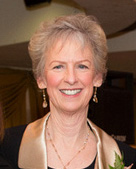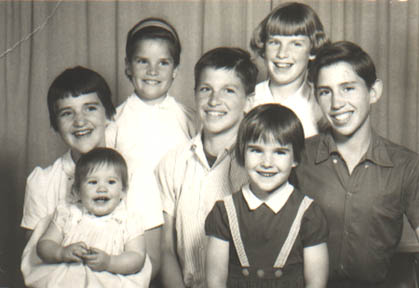
United We Stand


In memory of
Marguerite Louis (Peggy) Heldt Frederick
November 5, 1954 - April 25, 2015
by Nicholas Heldt

You all know Peggy was a blond, right? It was her only vanity, I think; she liked her blond hair to look good. So let's get that out of the way right off. I'm not here to falsely praise Peggy in every way and claim so had no shortcomings. I acknowledge she liked her hair to look good.
This trivial adult vanity might have been a reaction to the page boy haircuts her Mom gave her as a little girl. I know nothing about these things so I'm not qualified to say whether the page boy cut was attractive or otherwise on Peggy. I will say, though, that Peggy's page boy hair cut didn't distinguish her from her sisters because Becky, Angie and Janet also had page boy haircuts at the same time. Seriously, go to the family website - www.Heldt.com - click on the photo album link and you will find a posed portrait of the seven brothers and sisters taken in about December 1963 and you will see Becky in a page boy, Janet in a page boy, Angie - always the stylish one - has her hair pulled back with a headband to disguise her haircut, but as someone who was there I assure you it was cut in a page boy, and Peggy in a page boy that was a little curly on the sides. Even Marci who was only about 8 months old at the time has the infant version of a page boy.

This wasn't a one-time aberration. On the website right next to that 1963 photo of the seven kids there is a photo taken five years earlier in about 1958 when there were only six kids in the family and there are all four girls, including Janet as a toddler, in page boy haircuts. I'm no authority on this but I'm pretty sure a page boy haircut on a girl wasn't fashionable then - or ever, really. It was just Mom's frugality in a big family - a haircut simple enough that Mom could do it herself at home.
Go to the family website, take a look at the photos, and have a good laugh. This is your party favor from Peggy to thank you for coming today. It's OK to laugh. Peggy had a good sense of humor, including about herself, and she would laugh right along with you if you looked at the old photos together.
Did I mention Peggy was blond? Yes, I did. Being blond isn't unusual in a general sense but it was unusual in our family. Both her parents had dark hair. Peggy was one of seven brothers and sisters and none of the others are blond. I mention this only because it was the most obvious sign that she inherited some of her parents recessive genes while her brothers and sisters mostly inherited the dominant genes.
What does that mean?
It means that in a family of brothers and sisters who can't tell an anecdote in less than 17,000 words, Peggy could tell a short story.
It means that in a family that can talk - a lot - Peggy was the sister who could listen - a lot and well.
It means that in a family that was usually loud, Peggy was usually quiet.
Peggy was the middle child in a big family; number four out of seven children - a spot where it is easy to get lost. The center child in a family that big is rarely the center of attention. This middle spot was made worse because her next sister to arrive, Angie, was born less than a year after Peggy. So even when Peggy was the baby in a family of four children, this lasted less than three months before Mom was pregnant again and Angie was on her way. Peggy and Angie were so close in age that they were even in some of the same classes in high school, like twins. Angie remembers Peggy shepherding her in school, being her icebreaker.
The middle child who was never the center of attention is exactly who Peggy grew up to be; the center of our family who was never the center of attention. For more than a decade Peggy is the one who has hosted most of our family gatherings, who has been the connection that kept our family from drifting off in our many directions. Her home with Bruce is the place where our family has gathered in good times and bad. It is where we gathered when our Dad died.
When Peggy was a girl I worried about her because I thought she was guileless - in a negative sense; She seemed too trusting of people and what they said. It turns out this was one of her strengths. Situations that make many people anxious - a new school, a new city, a new religion (when she converted to Judaism) didn't make Peggy anxious because she was generally trusting and was quietly self-confident and at ease in new situations.
One reason Peggy was generally trusting of other people was because she liked most people and could empathize with them. This is a virtue more rare than it seems. Some communities and groups call themselves 'tolerant' but I've always thought this label is only half complementary - it carries the sense that 'those people' believe differently than me, or look differently than me, or live differently than me, but I can 'tolerate' this. Peggy wasn't 'tolerant' in this sense; she genuinely embraced a diverse community and her diverse family and our many diverse choices because she genuinely liked people. Long before California or any other state recognized same sex marriages Peggy always introduced Janet's partner Crystal as her sister-in-law. Peggy celebrated Hanukkah with Bruce and her sons, of course, but she combined this with a Christmas celebration for the Protestant wing of the family and a Solstice celebration for the Pagan wing and she separately hosted non-Holiday related family picnics for the non-Holiday celebrating wing. It was a chore she assigned herself; but it never seemed like a chore for her because she understood, sooner and better than the rest of us, the goodness of holding our big, complicated family together.
She loved her large, diverse, extended family and welcomed everyone into her and Bruce's home.
As Peggy grew up she remained guileless - in a positive sense; she was always sincere, straightforward, even frank. She never had a hidden agenda.
We all call her Peggy but her name is actually Marguerite Louise. She was named after her mother Marguerite Virginia. 'Marguerite Louise' is an awful lot of name. Even in the 1950s it was old-fashioned. But Peggy got more than her old-fashioned name from her mother. I mentioned the recessive blond gene and the recessive listening gene, but she also got the recessive no-drama gene. Troubles or conflict are made tougher by some people because they add their own drama. Peggy added no drama. Just the opposite; when there was conflict between her sisters or brothers Peggy had the gift of being in the middle without being in the middle - if that makes any sense - without taking sides.
If never being the center of attention and never adding drama makes Peggy sound dull then I've done a poor job describing her. Peggy had a sense of humor and a sense of adventure. She called Janet her 'fun sister,' but Janet will tell you (if you can spare half an hour) about the week Peggy joined her in Hawaii for the last week of Janet's sabbatical. She exhausted Janet with all of the adventures she insisted they share.
When death comes for someone too soon, as it has for Peggy, I become reflective. I ask myself, and many of you may ask yourselves, 'Have I lived the life I wanted?' 'What is the essence of my life and how will it seem to others when I am gone?' I have been mulling these questions about Peggy's life. Did she live the life she wanted? What was the essence of Peggy's life?
Jake told me a story of a day he and Peggy went skiing together. It was a perfect day with fresh, ungroomed powder snow. He and Peggy didn't ski the hard, steep runs or the technical mogul runs. They skied the intermediate runs, simply enjoying the perfect conditions on a beautiful day. Jake didn't think the story had any point except that it was a day he spent with Peggy that was a lasting, wonderful memory.
I have thought about Jake's story as I have asked the question about the essence of Peggy's life. Some people choose the steepest or hardest route and measure their achievements in life by how well they conquer or confront external obstacles; how many awards or distinctions they received, what tangible thing they amassed, what great projects they captained. I don't criticize this approach to life or diminish this kind of achievement. It has value. But I don't think other choices in life have lesser value. And I don't think the value of a life can only be measured against, or even can best be measured against, external markers. Your presence here today, the presence of so many of Peggy's friends, convinces me that this is right. Peggy did not hold high office in the land, did not lead an industry, did not forge a breakthough in science, did not take our breath away through art. No Wikipedia page will be devoted to Peggy's life. Peggy's choice the day she and Jake were skiing was ephemeral - to accept a gift of grace - and this produced a day of memorable beauty and joy for Jake, and I'm sure for Peggy as well.
This, I think, was Peggy's special gift. Every life encounters joy and sorrow. Peggy chose to accept the gifts of grace most of us stumble over and too often recognize only in the rear view mirror after we have sped by in our driven lives. More than most of us Peggy noticed when the grass was green. And more often than not, when she was around, she helped us see this too. I wasn't skiing with them the day that Jake described but I know the feeling he remembers. Without any fanfare or self-congratulation, without being the center of attention, Peggy spread grace and joy to all of us. She made it look effortless. To see her legacy, look around you at how many people are here today because their lives were enriched by Peggy.
Life isn't always fair. We are here today because life can be cruel and sometimes ends too soon. But I take solace, and hope all of you take solace as well, in remembering that Peggy's generosity to all of us, her sharing of grace and joy with all of us, was rewarded during her life with two fine sons, two wonderful daughters-in-law, grandchildren, the devotion of her husband Bruce, my admiration and the love of her extended family, and the affection of so many others including all of you.
Did Peggy live the life she wanted? Yes. Exceptionally well.
This is how I will remember Peggy. The happy, unassuming, friendly, middle child who inherited the recessive gene of genuine empathy for others - a gift from her mother - and grew up to be the happy, unassuming, beloved center of the life of our family; a friend to so many who brought a hostess gift of joy over every threshold she crossed. What an achievement!